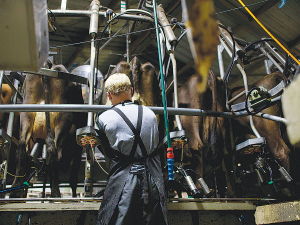DairyNZ opens applications for associate director role
DairyNZ is giving New Zealand farmers a unique opportunity to gain hands-on governance and leadership experience within the dairy sector.
 One of the main reasons for a shift to flexible milking is to reduce hours, make rosters more flexible and improve work.
One of the main reasons for a shift to flexible milking is to reduce hours, make rosters more flexible and improve work.
With milkings typically taking around 17 to 24 hours a week per worker, many farmers have been focusing on milking smarter to reduce hours and creative ways to shorten the working week - like the 22% who report they are using flexible milking.
One of the milking reasons for a shift to flexible milking is to reduce hours, make rosters more flexible and improve work/life balance for their team.
For Taranaki farmers Daryl and Karyn Johnson, using 3 in 2 milking has seen their team's working week shortened by six hours each per week. Many farmers are also having success with a 10 in 7 milking schedule that maintains traditional morning and afternoon milking times but frees up a few afternoons each week.
Milking smarter has seen some operations introducing a maximum milking time (MaxT), which can reduce milking times without compromising production or udder health. Interestingly, leaving some milk behind in slow milking cows can increase the flow rate in the next milking, improving milking efficiency.
Fonterra suppliers recently received Insights reports showing their milking efficiency compared to similar operations, and how much time they could save by reaching 80-100% milking efficiency. The average possible saving at peak was 8 hours per week.
Align Farms in Mid-Canterbury allow their team to pick shifts, with the first pick rotating between staff, usually with the most popular shifts being morning and midday, leaving afternoons free.
Flexible rostering means the team control their working week, allowing them to pick shifts around other commitments and hobbies, while also allowing Align Farms to take on people looking for work opportunities, including part-time positions. They describe these workers as some of the smartest people, and the farm benefits from having a diverse and interesting workplace.
Reducing the hours your people work to 50 hours or less a week reduces stress, fatigue, and the risk of accidents, and helps you attract and keep good employees.
For more information visit www.dairynz.co.nz/milking
Seonaid Aitchison is DairyNZ solutions and development specialist.
Fonterra’s impending exit from the Australian dairy industry is a major event but the story doesn’t change too much for farmers.
Expect greater collaboration between Massey University’s school of Agriculture and Environment and Ireland’s leading agriculture university, the University College of Dublin (UCD), in the future.
A partnership between Torere Macadamias Ltd and the Riddet Institute aims to unlock value from macadamia nuts while growing the next generation of Māori agribusiness researchers.
A new partnership between Dairy Women’s Network (DWN) and NZAgbiz aims to make evidence-based calf rearing practices accessible to all farm teams.
Despite some trying circumstances recently, the cherry season looks set to emerge on top of things.
Changed logos on shirts otherwise it will be business as usual when Fonterra’s consumer and related businesses are expected to change hands next month.
OPINION: Fonterra may be on the verge of selling its consumer business in New Zealand, but the co-operative is not…
OPINION: What does the birth rate in China have to do with stock trading? Just ask a2 Milk Company.